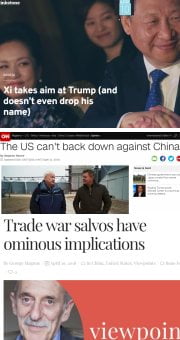As Donald Trump’s blundering pushes the world closer to a trade war, Xi Jinping comes to the rescue and nobly opens up China’s economy and embraces a free-market rules-based international order. Alternatively, the devious Communist leader attempts to con the air-head in the White House by spouting stale vague blather about market-opening while doubling down on hyper-nationalist predatory economic policies.
A ‘positive energy’ interpretation comes from Inkstone. This is the Jack Ma/South China Morning Post online vehicle for ‘soft power’ (motto: ‘translating China’ into stuff you Barbarians will like). It’s a bit like state-owned Sixth Tone, including an annoying/trendy website design, but it augments the ‘safe’ quasi-hard-hitting human-interest stories with overtly political coverage. It cheerily concludes the item on Xi’s Boao speech with the speculation that, if China keeps its airy promises, the country will be ‘very different’.
 Right down at the opposite, skeptical end of the spectrum, a conservative commentator at CNN describes China as no mere economic rival, but an emerging strategic threat like the USSR once was.
Right down at the opposite, skeptical end of the spectrum, a conservative commentator at CNN describes China as no mere economic rival, but an emerging strategic threat like the USSR once was.
The difference is that, back in the 1950s-70s, Western multinationals and financiers did not drool over babushkas’ spending power or Moscow stock-market listings. However much Beijing kills dissidents, puts Uighurs into camps, grabs others’ territory, starts United Front operations in your back yard – or steals your IP – polite Western society just goes on hugging the Panda. (At least young Hongkongers – bless them – get it.)
So we go halfway back down the scale to the genteel, moderate middle-ground. Economist George Magnus is no rabid anti-globalist or Cold Warrior; he is a wry commentator particularly known for Financial Times/BBC-worthy panty-wetting about Brexit. His opinion is that China is, indeed, implementing a systematic party-state industrial policy that especially targets AI and other futuristic sectors. He barely touches on how the commercial aspects overlap with dictatorship-entrenchment or rising military clout. That’s left for the uncouth. But he ends by stating that China’s…
“…reform and opening up, now 40 years old, is done and dusted.”
Trump is actually the biggest danger – the threat being that his gullibility, ineptness or impeachment let China off the hook.
(Update: See also this on ‘…outsiders fail to grasp how revolutionary it is simply to confront Beijing‘.)

“Airhead”..”Blundering”…I can’t believe it.
Surely Trump is everything the modern neo-con 80s nostalgia freak like yourself would desire: warmongering, exceptionalist and loaded with whores, money and syphilis.
There’s just no pleasing some folks.
And just look at what a monkey he is for the organ grinder Israel in Syria.
Man. He’s PERFECT!
It’s interesting to see how Inkstone is headed by Juliana Liu and includes a number of others who also moved from the BBC. I wonder if the Beeb knew at the time that their China team was essentially a Chinese State plant?
The Balding’s World piece is worth reading. Thanks for the link.
I did enjoy El Presidente-for-life and head of the one-party communist dictatorship who is building an airbase in international waters and recently forced TVB (Pearly) Whitey to air the towering 10,000 part
documentaryagitprop flim flam “Making Armed Forces Powerful” featuring military parades followed by military parades saying with a straight face: “A Cold War mentality is increasingly out of date”. Chutzpah with Chinese characteristics or Xi Jinping Doublethought?“‘Safe’ quasi-hard-hitting human-interest stories with overtly political coverage” … A good way to describe both the BBC and the Financial Times.
And you are a bit naïve if you think that anyone (eg current or future president of the US) can resist the roll-back of globalisation and the rise of nationalism.